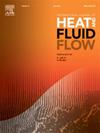Numerical analysis of fluid-thermal-structure coupling characteristics of CO2 booster pump valve
IF 2.6
3区 工程技术
Q2 ENGINEERING, MECHANICAL
International Journal of Heat and Fluid Flow
Pub Date : 2024-10-16
DOI:10.1016/j.ijheatfluidflow.2024.109611
引用次数: 0
Abstract
CO2 booster pump valves are key components in the CO2 oil drive industry, and their reliability is critical to the safe operation of pumping booster systems. Due to the special nature of CO2, heat transfer occurs during valve movement, which can cause damage to the valve body and poppet, and thus in-depth studies on CO2 properties are needed to better predict the locations where the valve is vulnerable to damage. However, relatively few studies have been conducted to analyze the fluid-thermal-solid coupling failure of CO2 booster pump valves. This paper establishes a multi-physics coupled thermodynamic model of CO2 booster pump valves, analyzes the transient simulation of valves at different valve openings, pressures and temperatures, and investigates the thermal properties of four different poppet materials. The results show that: with the increase of valve opening, the maximum deformation of the valve decreases sharply, and then tends to stabilize; in the process of pressure increasing from 4.77 MPa to 10.52 MPa, the turbulent kinetic energy inside the valve increases by about 78 %; it is also found that the thermal deformation of different poppet materials is directly proportional to the coefficients of thermal expansion of the materials, among which the deformation of aluminum alloy poppet is the largest. In addition, the results of thermal deformation and thermal stress distribution indicate that the failure region of the valve is usually concentrated in the poppet and its corresponding body wall. These results provide theoretical references for optimizing the structural design of CO2 booster pump valves and help reduce the risk of failure of CO2 booster pump valves.
二氧化碳增压泵阀流热结构耦合特性的数值分析
二氧化碳增压泵阀是二氧化碳驱油工业的关键部件,其可靠性对增压泵系统的安全运行至关重要。由于 CO2 的特殊性质,在阀门运动过程中会发生热传递,这可能会对阀体和阀芯造成损坏,因此需要对 CO2 的特性进行深入研究,以便更好地预测阀门容易损坏的位置。然而,对二氧化碳增压泵阀门的流体-热体-固体耦合失效进行分析的研究相对较少。本文建立了二氧化碳增压泵阀门的多物理场耦合热力学模型,分析了阀门在不同开度、压力和温度下的瞬态模拟,并研究了四种不同阀芯材料的热特性。结果表明:随着阀门开度的增加,阀门的最大变形量急剧下降,然后趋于稳定;在压力从 4.77 MPa 增加到 10.52 MPa 的过程中,阀门内部的湍流动能增加了约 78%;还发现不同阀芯材料的热变形量与材料的热膨胀系数成正比,其中铝合金阀芯的变形量最大。此外,热变形和热应力分布结果表明,阀门的失效区域通常集中在阀芯及其相应的阀体壁上。这些结果为优化二氧化碳增压泵阀的结构设计提供了理论参考,有助于降低二氧化碳增压泵阀的失效风险。
本文章由计算机程序翻译,如有差异,请以英文原文为准。
求助全文
约1分钟内获得全文
求助全文
来源期刊

International Journal of Heat and Fluid Flow
工程技术-工程:机械
CiteScore
5.00
自引率
7.70%
发文量
131
审稿时长
33 days
期刊介绍:
The International Journal of Heat and Fluid Flow welcomes high-quality original contributions on experimental, computational, and physical aspects of convective heat transfer and fluid dynamics relevant to engineering or the environment, including multiphase and microscale flows.
Papers reporting the application of these disciplines to design and development, with emphasis on new technological fields, are also welcomed. Some of these new fields include microscale electronic and mechanical systems; medical and biological systems; and thermal and flow control in both the internal and external environment.
 求助内容:
求助内容: 应助结果提醒方式:
应助结果提醒方式:


